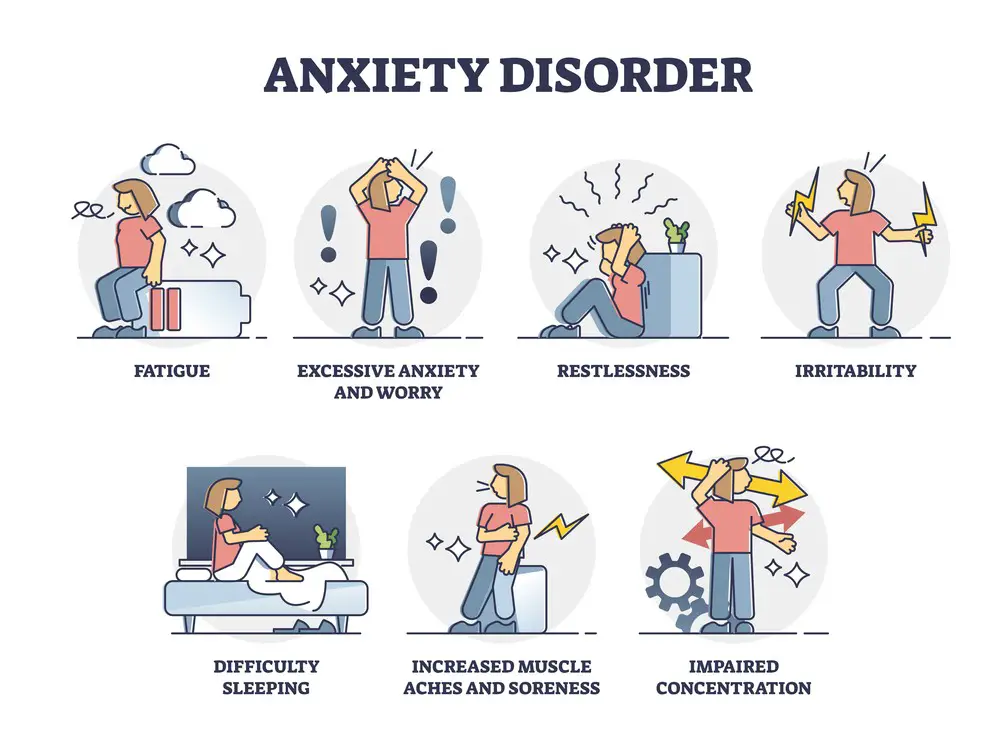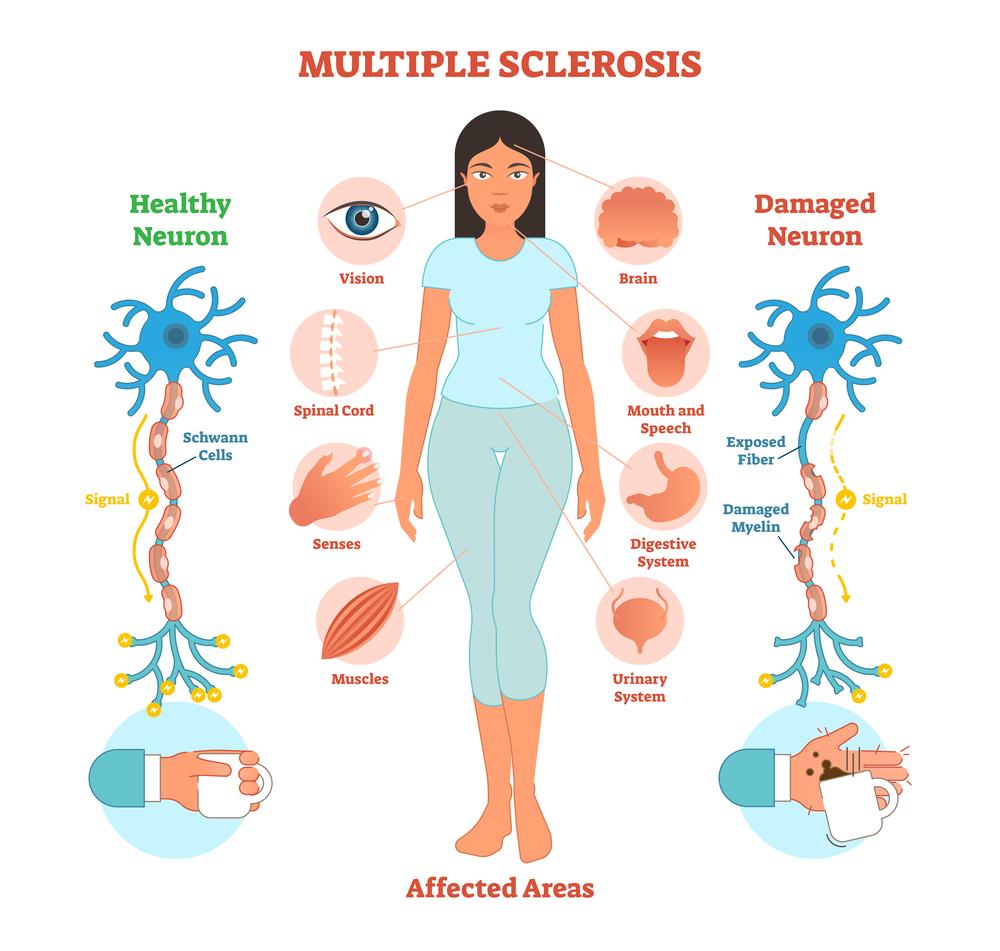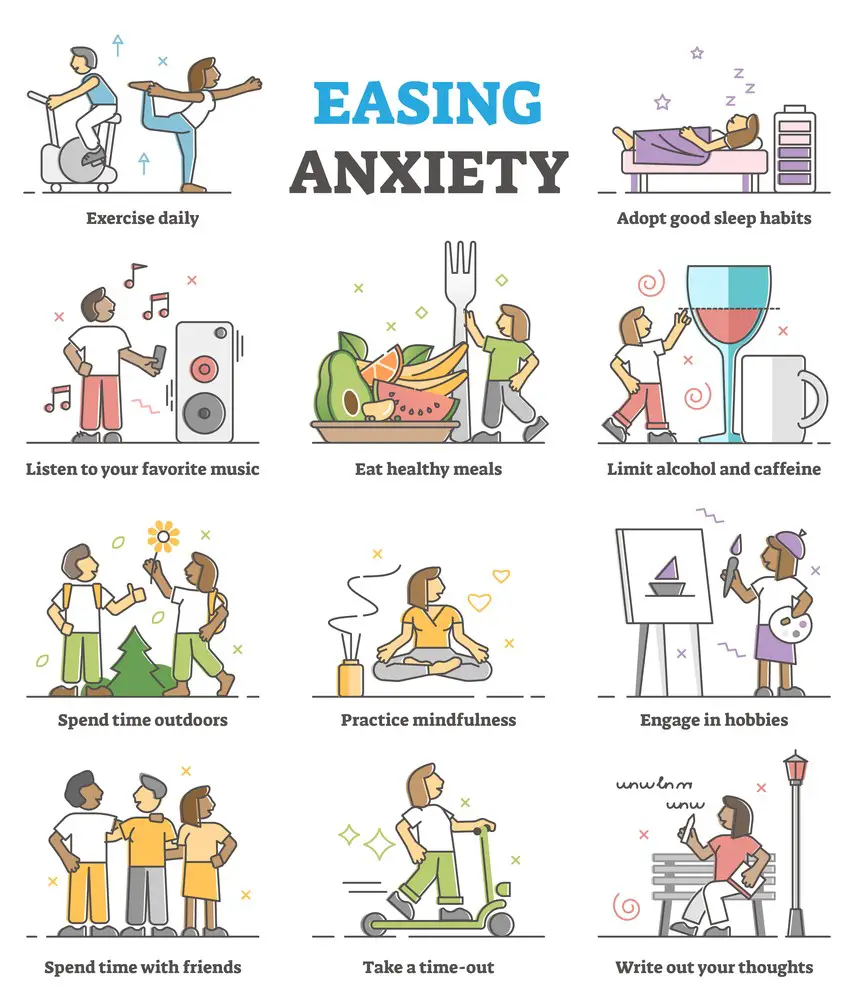As a BetterHelp affiliate, we receive compensation from BetterHelp if you purchase products or services through the links provided
We’ve all had those moments where a weird sensation creeps up on us—like a sudden tingling in our hands or feet. Your limb has just thrown a surprise party, and all the nerves are invited! But when that fizzy, pins-and-needles feeling shows up unannounced, it’s easy to slide down the rabbit hole of worry, wondering if it’s just a fleeting guest or a sign of something more persistent like Multiple Sclerosis (MS).
Here’s the deal: While both anxiety and MS can send your body into a tingle tornado, they’re not the same thing. It’s like mixing up an espresso shot with a whole latte—they might share a common ingredient, but the experience is different. Understanding the guest list of symptoms and knowing which is crashing your body’s party can make a difference in how you handle it.
In this post, we’re going to unravel this tingling mystery. We’ll chat about the who, what, when, and why of anxiety-induced tingles versus their MS counterparts. No medical jargon marathon here—just the straight talk to help you get a grip on what’s going on beneath your skin.
Ready to dive in? Here’s what we’ll cover:
- What’s Normal, What’s Not: Learn how to tell regular body quirks from symptoms that might need a second look.
- Anxiety vs. MS: Break down the difference between anxiety tingling vs MS tingling—because they’re not twins, not even close.
- Listen to Your Body: Tips on tuning into what your body tells you without hitting the panic button.
- When to Seek Help: The signs say it’s time to check in with a professional because Dr. Google doesn’t have all the answers.
So, whether you’re feeling the buzz after a caffeine binge or concerned about something more serious, let’s get to the bottom of this tingling conundrum. Stick around, and let’s get those answers you’ve sought.
While anxiety can manifest in signs, including tingling, MS is a neurological condition with distinct symptoms. Recognizing the disparities and similarities is essential for understanding and addressing these sensations effectively.
Let’s delve into the details to gain a clearer understanding of the specific treatment of anxiety tingling vs MS tingling, recognizing the differences, as well as how to differentiate and manage symptoms between them.
Understanding Anxiety Tingling
Understanding Anxiety-Induced Tingling: When Your Nerves Are On Edge
Ever felt like you’re tingling with worry? That’s anxiety saying hello to its buddy, paresthesia. This uninvited guest brings a cocktail of sensations like numbness, the classic pins and needles, or even that weird feeling of your skin crawling. And it’s not picky—your hands, feet, mug, or scalp could all be the life of the party. But why, you ask?
Well, when anxiety spikes, it’s like your body’s sounding the alarm—code red, everyone to their battle stations! But instead of fighting or fleeing, you’re there wondering why your skin feels like it’s throwing its version of a rave.
This electric dance party under your skin kicks off when your blood flow gets funky, muscles tense up, or your nerves decide to turn the sensitivity dial up to eleven. It’s all about your body reacting to stress. Remember, it’s not just you—this is a pretty common shindig that happens to the best of us when anxiety rears its head.
The Body-Mind Connection: How Anxiety Sends Tingling Through Your System
Here’s a little science for you: anxiety and tingling go hand-in-hand because your body’s hardwired to react to stress with a quick one-two punch. Think of it as your internal security system—it spots trouble (even if it’s just in your head) and slams that panic button. The result? A cascade of reactions, with Tingling being one of the VIP guests.
This whole shebang is your body’s version of a drill. It’s practicing for a real emergency, except sometimes it takes the drill too seriously. So, when you’re stressing over that email, your body is prepping like you’re about to wrestle a bear. Overkill much?
But don’t worry, it’s a false alarm, and there are ways to calm the nerves. Simple breathing exercises, a quick walk, or a jam session to your favorite tunes can help tell your body, “Hey, stand down, it’s just an email.”
Causes and Triggers of Anxiety Tingling
The common causes and triggers of tingling in individuals with an anxiety disorder.
Think of those tingles as your body’s quirky way of saying, “Hey, I’m freaking out a bit here!” It’s not just about feeling nervous or scared—your body actually goes through a whole performance. So, what’s on the trigger list? Well, it could be that pounding heart when you’re about to give a speech or the sweaty palms in a packed elevator. Anxiety isn’t picky—it’ll use anything from a full-blown panic attack to just a nagging worry to start the tingling concert in your body.
Now, imagine your nervous system is like a sensitive car alarm that goes off with the slightest bump. High stress is like a fender bender to your nerves, setting off that alarm. And sometimes, it doesn’t even need a real bump—just the fear of one is enough to get the tingles going. It’s your body’s way of prepping you for action—except sometimes, it’s a rehearsal with no real show to follow.
How stress and anxiety can manifest as physical sensations?
When Anxiety Makes You Feel All Buzzed Up: You know the feeling you get when you’re watching a thriller, and you’re on the edge of your seat? That’s kind of what happens inside your body when you’re anxious. Your body gets all ramped up; muscles coiled tight, ready to sprint or swing into action. But instead of running or fighting, you’re probably just sitting there, feeling all that buzz with nowhere to go.
This is your body’s stress response, but sometimes it gets overzealous. It’s like your internal defense mechanism decides to go to battle stations when all you’re doing is worrying about a deadline. That’s when you might feel that odd tingling as if your body’s energy cannot escape. It’s weird, it’s uncomfortable, but hey, it’s also pretty normal under the circumstances.
Recognizing MS Tingling
Tingling in Multiple Sclerosis
Tingling sensations experienced by individuals with Multiple Sclerosis.
Tingling associated with Multiple Sclerosis is fundamentally different from anxiety-related tingling. MS is a neurological condition that affects the central nervous system.
Tingling in the peripheral nervous system in individuals with MS symptoms is often referred to as paresthesia, similar to anxiety-related tingling. However, in MS, it is a result of demyelination, where the protective covering of nerve fibers is damaged, leading to disruptions in nerve signals.
Undersanding the relationship between MS and other neurological symptoms
Neurological symptoms, including tingling, numbness, muscle weakness, and coordination difficulties, characterize MS. These symptoms occur due to the body’s immune system attacks, mistakenly attacking the nerve pain-protective myelin sheath, leading to nerve damage. The tingling experienced in MS is a direct result of nerve dysfunction.
Tingling and Multiple Sclerosis: A Deeper Look
Regarding Multiple Sclerosis, tingling is more than just an odd sensation—it’s a clue to a deeper issue in the central nervous system. Here’s the scoop on MS-related tingling:
- MS Tingling: The Basics MS can make you feel like you’ve got a personal electrician rewiring you in ways you didn’t sign up for. That tingling? It’s a hallmark of how MS messes with your nerve fibers. The protective layer around your nerves, called myelin, gets damaged in MS. This is like stripping the coating off electrical wires—it causes signals to go haywire.
- Understanding Paresthesia in MS This fancy term, paresthesia might sound similar to what happens with anxiety. Still, it’s a different beast in MS. Those with MS might feel tingles, numbness, or even a sensation of wearing an invisible glove or sock. It’s unpredictable and varies a lot from person to person.
- Why MS Tingling Stands Out Unlike the fleeting tingles from a spike in anxiety, MS-related tingling tends to stick around and can be quite persistent. It’s not just about feeling stressed or scared; it’s a constant reminder that there’s a literal disconnect in how the body’s messaging system works.
Understanding this type of tingling is key to recognizing MS and getting the right treatment. So, if your tingles are more persistent than a pesky fly at a barbecue, it might be time to chat with a doctor about whether MS could be the cause.
 Diagnosing MS Tingling
Diagnosing MS Tingling
How do healthcare professionals diagnose tingling related to MS?
Diagnosing tingling in MS involves a thorough medical evaluation, including a detailed medical history, neurological examination, and imaging tests like magnetic resonance imaging (MRI).
These diagnostic tests help healthcare professionals identify any lesions or demyelination in the affected area of the central nervous system, confirming an MS diagnosis.
Medical tests and evaluations used for MS diagnosis
MS diagnosis is typically confirmed through MRI scans, cerebrospinal fluid analysis, and evoked potential tests, which measure the speed of nerve impulses. These tests are essential for the disease course and identifying the underlying causes of specific neurological changes in MS.
Key Differences and Similarities
Distinguishing Features
Spotting the Difference: Anxiety-Induced vs. MS-Induced Tingling
When it comes to tingling, not all types are created equal. Here’s how to tell apart the tingles that come from a bout of anxiety from those signaling something like Multiple Sclerosis (MS):
- The Root Cause: Anxiety tingles are your body’s immediate reaction to stress. Think of it as an internal alarm system that goes off when you’re anxious. MS tingles, on the other hand, are due to actual changes in the nerves themselves—like frayed wires causing a faulty connection.
- How Long They Hang Around: Anxiety tingles tend to come and go and are usually short-lived (they might just pop by to say “hello” during a panic attack, for instance). MS tingles are more like that one guest who overstays their welcome at the party; they can linger and often stick around as part of the ongoing saga of MS.
- Patterns and Triggers: If your tingles tend to show up during moments of high stress or panic, that’s a strong hint they’re anxiety-related. But if they seem to have a life of their own, cropping up regardless of your mood or stress levels, MS might be the culprit.
Knowing these differences can help you determine the right approach and when to seek medical advice. Always remember, though, when in doubt, it’s best to consult with a healthcare professional—they’re the experts, after all.
Similarities or overlapping symptoms can complicate diagnosis.
While anxiety-related tingling and MS-related tingling have distinct origins, they share some common symptoms, such as tingling, numbness, muscle stiffness, and weakness. This overlap can complicate diagnosis, making it essential for healthcare professionals to conduct thorough evaluations to determine the underlying cause of other MS symptoms.
Coping and Managing: Strategies for Handling Tingling Sensations
When tingling sensations become a frequent visitor in your daily life, it’s important to have a toolbox of strategies to cope and manage these feelings. Here’s how you can keep those tingles in check:
- Stress-Reduction Techniques: Deep breathing, meditation, and yoga can be your first line of defense against anxiety-induced tingling. These practices promote relaxation and can help temper the body’s stress response.
- Regular Exercise: Physical activity is a powerful stress-buster. It can help manage anxiety levels, improve circulation, and reduce muscle tension—all of which can alleviate tingling.
- Mindful Monitoring: Keep a log of when the tingling occurs, what you’re doing, and your stress levels. This can help you identify patterns and triggers, making it easier to avoid or address them.
- Healthy Sleep Habits: Never underestimate the power of a good night’s sleep. Ensuring you get enough rest can help regulate your body’s functions and is crucial for stress management.
- Nutritional Balance: A well-balanced diet can support nerve health. Ensure you get enough vitamins and minerals, particularly those known to support nerve function like Vitamin B12 and magnesium.
- Professional Support: Sometimes, the best coping strategy involves seeking help. Therapists can provide valuable techniques for managing anxiety, and healthcare providers can offer treatments for physical symptoms.
- Peer Support: Connecting with others who understand what you’re going through can be incredibly reassuring. Consider joining a support group for individuals with anxiety or MS.
- Educate Yourself: Understanding your condition empowers you to make informed decisions about your health. Don’t hesitate to ask your doctor questions or seek out reliable information.
Remember, while these strategies can be helpful, they’re not substitutes for professional medical advice. If your tingling sensations are a concern, a healthcare provider can offer the most appropriate treatment options for your specific situation.
Taking Action: When to See a Doctor
Recognizing when to seek professional help is a crucial step in managing your health, especially when it comes to differentiating between anxiety tingling and symptoms of a condition like MS. Here are some signs that it’s time to reach out to a healthcare provider:
- Persistent Symptoms: If that tingling sensation has overstayed its welcome and become a regular part of your day, it’s worth discussing with a doctor.
- Escalation: When the intensity or frequency of the tingling ramps up, or if it starts interfering with your daily activities, it’s a signal that professional insight is needed.
- Accompanying Symptoms: Tingling that comes along with other changes, like muscle weakness, trouble with coordination, or issues with your vision, could be a sign of something that requires medical attention.
- Lack of Improvement: If you’ve tried managing stress and anxiety with lifestyle changes and relaxation techniques, but the tingling persists, it could be time for a check-up.
- Worry and Preoccupation: When worry about your symptoms starts to take a significant toll on your mental health, or if you find yourself constantly concerned that something serious is at play, a professional can provide peace of mind or a path forward.
Remember, getting help isn’t a sign of weakness; it’s a proactive step toward understanding your body and caring for your well-being. Health professionals can offer a thorough evaluation, run necessary tests, and guide you through the following steps, whether managing anxiety or addressing another underlying health issue.
Self-Help Strategies: Managing Anxiety-Induced Tingling
Feeling like a human sparkler thanks to anxiety? Breathe deeply, practice mindfulness, or get moving with some exercise. These are your go-to strategies to calm down those nervous parties.
Professional Care: Seeking Treatment for MS
For the MS tingle, professional care is key. If MS is the DJ for your tingling bash, a neurologist can help turn down the volume with medication, physical therapy, and other tailored treatments.
Living with Tingling: Lifestyle Adjustments and Support
Whether it’s anxiety or MS, minor lifestyle tweaks can make a big difference. From diet to exercise to support groups—find what works for you and stick to it.
Busting Myths: Separating Fact from Fiction on Tingling Sensations
It’s time to tackle some tall tales head-on. There’s a lot of misinformation floating around about those tingles and twitches, and we’re here to clear the air:
- Myth: “It’s all in your mind.” Fact: While anxiety does originate in the brain, the symptoms are genuine, and the tingling you feel is a genuine physical response to your psychological state.
- Myth: “If you have tingling, it’s MS.” Fact: Not true. Tingling can be a symptom of many conditions, and only a thorough medical evaluation can determine if MS is the cause.
- Myth: “Anxiety-related tingling is no big deal.” Fact: Any symptom that causes concern or affects your quality of life is a big deal. It’s important to take anxiety seriously and address its physical manifestations.
- Myth: “People with MS can’t lead normal lives.” Fact: People with MS can live fulfilling lives. While adjustments may be necessary, treatment and support have come a long way in managing the condition.
Understanding the truth behind these myths, you can better navigate your symptoms and the conversations around them, ensuring you’re operating from a place of knowledge and not misconception.
Next Steps: Crafting Your Personal Action Plan for Managing Tingling
Now that you’ve got the lowdown on what might be causing those tingles, it’s action time. Here’s how to sketch out a plan that’ll help you take charge:
- Symptom Diary: Grab a notebook or use an app to log your tingling episodes. Note the time of day, what you were doing, and your stress levels. This can help spot patterns and triggers.
- Stress Management Routine: Carve out time for activities that reduce stress. Maybe it’s a morning jog, a lunchtime meditation, or an evening hobby. The goal is to have a go-to method for calming those nerves.
- Doctor’s Appointment Prep: If you’re gearing up for a medical visit, jot down your symptoms, any questions you have, and what you want to get out of the appointment. Being prepared helps you make the most of your time with the doc.
- Healthy Lifestyle Choices: Commit to making small daily changes. Swap out that extra coffee for a glass of water, or choose the stairs over the elevator. It’s all about making choices that support overall well-being.
- Educational Resources: Keep learning about your symptoms and potential conditions. Knowledge is power, and the more you know, the better equipped you’ll be to handle what comes.
- Support System: Reach out to friends, family, or support groups. Sometimes just talking about what you’re experiencing can lighten the load.
Your action plan is your roadmap to better managing those tingling sensations and taking control of your health. Start small, be consistent, and remember, this plan is for you—customize it to fit your life and your needs.
Frequently Asked Questions
Can tingling in my arms and legs be a sign of anxiety?
Yes, tingling sensations in your arms and legs can indeed be a sign of intense feelings of anxiety.
When you experience high levels of stress or anxiety, your body’s “fight or flight” response is triggered. This physiological response can lead to various physical symptoms, including tingling and sudden weakness.
The MS tingling patterns are typically a result of heightened muscle tension, changes in blood flow, high blood pressure, and increased sensitivity during anxious moments. It’s essential to recognize that anxiety-related tingling is a manifestation of your body’s response to psychological distress, and it often subsides as stress levels decrease.
However, if you are concerned about such sensations, it’s advisable to consult a healthcare professional to rule out other potential causes and discuss appropriate management strategies.
What are the neurological symptoms of Multiple Sclerosis?
The symptoms of Multiple Sclerosis include body-spot tingling, numbness, muscle weakness, coordination difficulties, vision problems, fatigue, and balance issues. These symptoms result from the damage to the central nervous system, brain, and spinal cord and the disruption of nerve signals.
How do I know if my tingling is due to MS?
MS tingling tends to be more persistent and often accompanies other symptoms like muscle weakness or vision changes. A healthcare professional can provide a definitive answer.
Are there any quick fixes for anxiety-induced tingling?
Quick, no—effective, yes. Techniques like deep breathing, exercise, or meditation can help alleviate anxiety-induced tingling. Consistency is key.
When should I worry about tingling sensations?
If tingling persists, becomes painful, or is accompanied by other concerning symptoms, it’s time to consult with a healthcare professional.
Can lifestyle changes really help with tingling sensations?
They can. Managing stress, exercising, and eating a balanced diet can improve overall well-being and may reduce the frequency of tingling episodes.
- Left Arm Pain and Anxiety: Understanding the Relationship - November 23, 2023
- Anxiety Paralysis: Coping with Overwhelming Stress - November 23, 2023
- Anxious vs. Nervous: Differentiating Emotions and Responses - November 15, 2023
This site contains affiliate links to products. We will receive a commission for purchases made through these links.





 Diagnosing MS Tingling
Diagnosing MS Tingling



